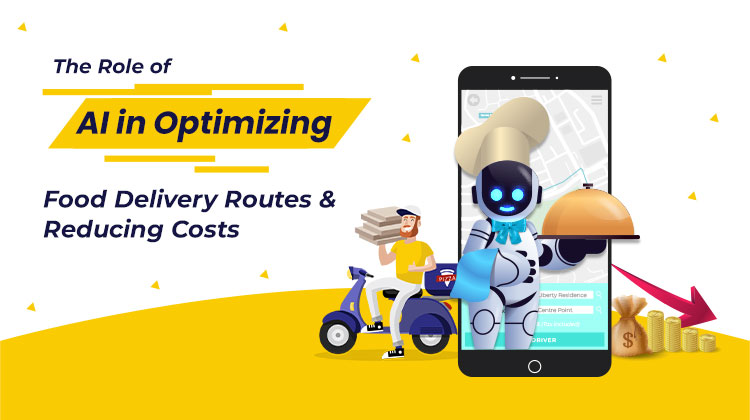
01 Nov, 2024
The food delivery industry has grown at a rapid pace, with the need for quick and efficient service becoming more critical than ever. As demand continues to rise, companies are turning to advanced technologies like artificial intelligence (AI) to optimize their operations, streamline delivery processes, and reduce costs. Artificial Intelligence in food delivery has revolutionized the way businesses approach challenges such as route planning, cost management, and customer satisfaction.
In this blog, we will explore how Artificial Intelligence in food delivery impacts the industry. We'll also provide insight into how AI can enhance efficiency and reduce operational costs.
The Growing Importance of AI in Food Delivery
As food delivery services expand, managing deliveries efficiently has become a major challenge. Factors like multiple orders, traffic congestion, delivery time windows, and road conditions make manual route planning increasingly inefficient. Artificial Intelligence has emerged as a solution by offering sophisticated algorithms that can calculate optimal routes in real-time, improving delivery times while reducing operational costs.
AI can process massive amounts of data, including current traffic conditions, weather patterns, and historical delivery data. By analyzing this information, AI systems can recommend the best delivery routes, ensuring that orders arrive on time with minimal fuel consumption. This real-time data processing is a game-changer, allowing companies to make data-driven decisions and improve overall customer satisfaction.
Incorporating AI-driven route optimization features into your platform is critical if you're considering food delivery app development. With AI-powered systems, businesses can automate complex decision-making processes, enabling faster and more efficient deliveries without human intervention.
Enhancing Efficiency with AI-Powered Route Optimization
One of the key benefits of AI in food delivery is the optimization of delivery routes. Traditional route planning often results in longer delivery times and increased costs due to traffic delays or inefficiencies in planning. AI addresses this issue by analyzing real-time data from GPS systems, traffic reports, and delivery history, which allows for more precise planning.
For example, if there’s a sudden road closure or traffic jam, AI systems can instantly reroute drivers to avoid delays. This ensures that deliveries are completed faster, improving customer satisfaction while reducing the overall operational burden.
Food delivery app development can take full advantage of AI-driven route optimization. By integrating these features into the platform, businesses can ensure they reduce delivery times and enhance the overall customer experience. Moreover, this automation minimizes the need for manual planning, allowing managers to focus on other aspects of their business operations.
Reducing Operational Costs with AI
While optimizing routes is a key focus, AI also plays a crucial role in reducing operational costs, one of the biggest pain points for companies in the industry. For instance, fuel consumption is a significant expense for food delivery services. By optimizing delivery routes using AI, companies can lower fuel usage, directly impacting their bottom line.
Additionally, AI-powered systems provide predictive maintenance for delivery vehicles. These systems monitor vehicle data in real-time and alert managers when maintenance is required, helping prevent costly breakdowns. Proactively managing vehicle health not only reduces repair costs but also ensures that the delivery fleet is running efficiently, with fewer interruptions.
Companies developing food delivery apps should prioritize integrating AI features that focus on cost reduction. AI’s ability to cut down fuel consumption and monitor vehicle health positions it as a valuable tool for businesses seeking to optimize operations and save on expenses. This not only gives companies a competitive advantage but also promotes sustainability by lowering their carbon footprint.
Leveraging AI for Enhanced Customer Satisfaction
Beyond reducing costs and improving efficiency, Artificial Intelligence in food delivery has the potential to significantly improve customer satisfaction. AI can analyze data from past orders and delivery patterns to predict customer preferences and behavior, providing businesses with actionable insights. These insights can be used to offer personalized promotions, recommend specific items, and improve overall service quality.
Moreover, AI can predict demand surges, helping businesses manage staffing and inventory more effectively. For example, AI systems can identify peak hours and anticipate high-demand periods, ensuring that companies have enough drivers and stock on hand to meet customer needs. This proactive approach minimizes delays and ensures that customers receive their orders on time.
When considering food delivery app development, businesses should look beyond just delivery optimization. Incorporating AI-powered customer experience features can set your platform apart by offering personalized services, enhancing loyalty, and increasing repeat orders. This can also provide an edge in a crowded and competitive food delivery market.
The Importance of Choosing the Right Food Delivery App Development Company
The integration of AI into a food delivery platform is a complex process that requires specialized knowledge and expertise. Choosing the right food delivery app development company is crucial for businesses looking to incorporate AI-driven solutions effectively. A development company with experience in AI-powered food delivery systems can help you identify which features will provide the most value for your business.
For example, a skilled food delivery app development company will not only help you integrate AI-powered route optimization but will also guide you on incorporating predictive analytics, customer personalization, and maintenance monitoring. They will ensure that these features are seamlessly implemented and that your platform runs efficiently.
When developing a project, it's essential to work with a company that understands AI technologies and can build a scalable platform that evolves as the business grows. This way, your app can stay competitive by adapting to new technologies and customer expectations.
The Future of AI in Food Delivery
Looking ahead, the future of AI in food delivery is bright. Advancements in machine learning, data analytics, and AI technologies are poised to drive even more innovation in the industry. For example, AI can be used to predict traffic patterns more accurately, offering better delivery time estimates and reducing delays. As AI-powered systems evolve, they will be able to make more sophisticated real-time decisions, further enhancing delivery efficiency.
Moreover, autonomous delivery vehicles, powered by AI, are on the horizon. These vehicles have the potential to revolutionize the food delivery industry by eliminating the need for human drivers, thereby cutting down labor costs and further streamlining operations. This technology, combined with AI-driven route optimization and predictive maintenance, can result in fully automated delivery systems that are both efficient and cost-effective.
Businesses that invest in food delivery app development now will be well-positioned to take advantage of these upcoming advancements. By staying ahead of the curve and embracing AI-driven innovations, companies can maintain a competitive edge in the ever-evolving food delivery landscape.
Conclusion
The integration of Artificial Intelligence in food delivery is transforming how businesses operate, offering significant benefits in terms of optimizing delivery routes, reducing operational costs, and enhancing customer satisfaction. For businesses looking to build or improve their food delivery platforms, partnering with Idiosys Tech, an experienced food delivery app development company in Kolkata, is essential. The right development partner will ensure that AI technologies are implemented efficiently and effectively, giving your platform the scalability needed to grow.
--------------------------------------------------------------------------------------
How does AI optimize delivery routes?
AI uses algorithms to analyze real-time data, such as traffic, weather, and order locations, to find the most efficient routes for deliveries.
Can AI help reduce delivery costs?
Yes, by optimizing routes and improving resource allocation, AI can significantly reduce fuel consumption, labor costs, and overall operational expenses.
What AI techniques are used in route optimization?
Techniques include machine learning, predictive analytics, natural language processing, and reinforcement learning.
Can AI use real-time data for route optimization?
Yes, AI can process real-time data, such as traffic, weather, and road conditions, to adjust routes dynamically for maximum efficiency.
What are the main benefits of using AI in food delivery?
Key benefits include reduced delivery costs, faster delivery times, improved customer satisfaction, and better resource management.
How does AI provide accurate delivery time predictions?
AI uses historical data, traffic patterns, and real-time conditions to predict delivery times accurately, enhancing customer satisfaction.
How does AI work with GPS for route optimization?
AI uses GPS data to monitor real-time location and adjust routes based on current conditions, ensuring efficient navigation.
--------------------------------------------------------------------------------------
You May Also Read
How a food delivery app can transform your restaurant business in 2023

